Essential Supplies for Caring for Aviary Birds


Intro
Birds, with their vibrant colors and melodious songs, bring a unique charm to our lives. Whether you’re a seasoned avian aficionado or just beginning your journey as a bird parent, understanding the essential supplies for your feathered companions is key to ensuring they thrive in a loving environment. An aviary isn’t merely a home; it’s a sanctuary for these delightful creatures.
In this article, we will discuss various supplies critical to your birds’ well-being, covering the essentials from nutrition to habitat setup. By the end, you’ll be equipped with a comprehensive toolkit, allowing you to create a nurturing space that supports not only the physical needs of your birds but their emotional and social health as well.
Avian Care Basics
Importance of Proper Nutrition
Just like people, birds need balanced diets to flourish. Many owners overlook this aspect, leading to health complications down the line. Nutritional needs vary widely—an African Grey might chomp away at pellets, while a budgerigar gets its fill from seeds and fresh veggies. Always research specific requirements for your bird’s species to ensure a balanced intake.
Understanding Bird Species and Their Needs
Knowing your bird’s species is more than trivia. Each species has distinct behaviors and needs. For instance, sociable cockatiels thrive in pairs but might get stressed when alone for too long. On the other hand, some solitary species, like the Blue Jay, prefer a more defined personal space. Observing these traits helps in creating a comfortable environment.
Basics of Birds Habitat Setup
A well-equipped habitat can significantly influence a bird’s happiness and health. Each aviary should include adequate space, perch varieties, and enrichments that mimic their natural environment.
- Perches: Offer a mix of thicknesses and textures.
- Toys: Rotate different types to keep boredom at bay.
- Flying Space: Ensure enough room for exercise.
Make sure the cage is spacious enough for your bird to stretch its wings and fly around. Regular cleaning of the habitat is also crucial, as it prevents disease and promotes a healthy living space.
Grooming and Hygiene Tips
Maintaining cleanliness directly impacts your bird’s health. Regular grooming not only keeps feathers in top condition; it also helps in creating a bond between you and your pet. This can include:
- Regular baths or misting: Depending on the species, some birds enjoy a good soak.
- Claw trimming: Before grooming begins, it’s wise to consult a vet for best practice.
Interacting with Your Pet Bird
Building Trust and Connection
Creating trust takes time but is essential. Start with gentle conversations and hand-feeding treats. This method helps form a bond that allows your bird to feel secure in your presence.
Training Techniques and Tips
Training your bird goes beyond just teaching tricks. Familiar commands can foster communication. Use positive reinforcement techniques, such as offering a small treat for desired behavior—birds respond well to consistency.
Fun Activities for Bird Owners and Their Birds
Engaging in activities strengthens bonds and can brighten up a bird’s day. Activities might include:
- Interactive toys: Invest in puzzle toys that challenge their way of thinking.
- Out-of-cage time: Allowing supervised time outside their habitat encourages exploration.
Recognizing Bird Cues and Behaviors
Understanding your bird’s body language can provide insights into their emotions. Read their posture and vocalizations; if they puff up or squawk excessively, it could indicate stress.
Emotional Well-Being of Birds
The Role of Play and Socialization
Play is fundamental to a bird’s happiness. Social birds, like Parakeets, thrive on interaction—both with their owners and fellow birds. Providing socialization opportunities can drastically reduce boredom and stress.
Enhancing Birds' Emotional Health
Incorporating diverse experiences can promote mental and emotional enrichment. Things like changing their environment or introducing new toys can trigger curiosity.
Assessing Bird Stress and Remedies
Recognizing stress is half the battle. Stress can manifest in several ways, from plucking feathers to changes in vocalization. If you notice these signs, check for environmental factors such as over-crowding or lack of stimuli.
Building Strong Human-Bird Bonds
Invest time in your bird’s affection. Frequent handling and gentle, calm interactions will foster trust. Mutual respect is the foundation of a strong bond.
Bird Health and Safety
Common Health Issues and Prevention
Birds, despite their robust demeanor, can face various health issues. Preventative care is often the best approach. Regular vet check-ups, proper diet, and a clean living environment are paramount.
Routine Veterinary Care
Establishing a routine vet care plan helps ensure diseases are caught early. Often, avian vets can provide crucial insights into your bird’s overall health.
Environmental Hazards to Avoid
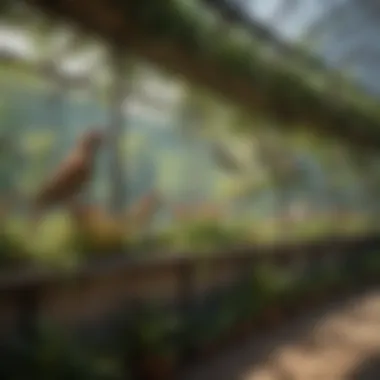

Be mindful of hazards in the home. Items like ceiling fans, open windows, and toxic plants can pose serious risks to your bird’s safety.
Signs of Illness or Distress
Monitoring behavior for signs of illness is critical. Look for appetite changes, unusual droppings, or lethargy. Any deviations from the norm should be discussed with a vet immediately.
Fun Facts and Quirky Insights
Unique Traits of Popular Bird Species
Many bird species have distinct traits. For example, the Lovebird is known for its strong pair bonds, whereas the Macaw is renowned for its exceptional talking abilities.
Historical and Cultural Significance of Birds
Birds hold special places in various cultures. In ancient Rome, for instance, augurs observed the flight of birds to forecast the future.
Famous Bird Owners and Their Stories
Even celebrities take pride in their feathered friends! For instance, actor and animal rights activist Ellen DeGeneres has often shared her love for birds on social media.
By recognizing the importance of each aspect of avian care, you set the stage for the best possible life for your birds. Caring for them isn't just fulfilling their basic needs; it’s about enriching their lives and fostering a deep connection that transcends the ordinary.
Understanding Aviary Bird Needs
Taking proper care of aviary birds extends beyond just feeding and providing shelter. Understanding their needs is a crucial part of fostering their well-being. Birds are not just pets; they are intelligent beings with specific ecological and emotional requirements. Recognizing these needs sets the stage for healthy, fulfilled birds and satisfied owners.
Each species of bird comes with its own unique set of affectionate quirks and dietary requirements. Whether you’re nurturing a lively budgie or a majestic cockatoo, grasping the essentials for their care can lead to a more harmonious life together. An informed approach ensures that your feathered friend does not just survive, but thrives in a cozy environment.
The benefits of understanding these requirements are manifold:
- Informed Choices: Knowledge about specific birds’ needs informs better decisions regarding diet, housing, and social interaction.
- Health and Longevity: Birds that receive adequate care tend to live longer, healthier lives, reducing veterinary bills along the way.
- Behavioral Harmony: Birds displaying stress or behavioral issues often lack proper care; recognizing what they need helps in addressing these concerns.
Basic Requirements for Care
To provide an optimal home for your aviary birds, you need to focus on basic requirements such as food, a clean environment, and social interaction. Here are some essentials:
- High-Quality Feed: A varied diet is key, ensuring birds receive the necessary nutrients. Look for seeds, pellets, and specialized mixes tailored for their specific needs.
- Fresh Water: Clean water must always be available. Birds use it for drinking and sometimes bathing, making it vital for their hygiene.
- Social Interaction: Birds are social creatures. They often require interaction with humans or other birds to stay mentally stimulated and emotionally balanced.
Housing Considerations
Finding the right housing is an absolute must for bird happiness. The size of the aviary plays a significant role in their comfort. Here are some aspects to ponder:
- Space: Birds need room to stretch their wings. An oversized aviary allows for movement and flight, which is crucial for their physical fitness.
- Ventilation: Ensure the insect-free space has good airflow, essential for maintaining a healthy environment, especially if multiple birds share the space.
- Safety Features: The aviary must be secure from predators and hazards. That includes robust locks and durable materials to withstand wear and tear.
Understanding these necessities ensures that owners create a suitable environment for their birds, promoting well-being and satisfaction. Only by grasping these needs can one build a strong foundation for an enriching life for their avian companions.
Essential Nutrition Supplies
When it comes to keeping your aviary birds healthy and happy, nutrition stands tall as a foundational pillar. Just as a well-balanced diet is crucial for humans, it holds a similar weight for birds, greatly affecting their vitality, plumage quality, and even their mood. Having a well-thought-out dietary plan isn't just a nice-to-have; it's an essential part of responsible bird-keeping. It enables bird owners to tackle potential health issues before they arise and set the stage for an active, vibrant life for their feathered companions.
High-Quality Seeds and Pellets
Providing a constant supply of high-quality seeds and pellets is the heart of any aviary diet. Seeds alone, however, are not a full meal. Each type carries its own mix of nutrients and values that can change the game for your birds, with pellets offering a more balanced alternative. Pellets often come fortified with vitamins and minerals key to supporting overall health.
Choosing products with minimal fillers ensures your birds are getting the most out of their diet. A mix tailored to your birds’ specific species will also help. Between millet, sunflower seeds, and safflower, the variety can be a feast in itself! However, be cautious—overfeeding seeds can lead to obesity; moderation is the name of the game.
Fresh Fruits and Vegetables
Introducing fresh fruits and vegetables is like opening the door to a whole new world of flavor and nutrients. Birds naturally love to munch, and these additions not only tickle their taste buds but also contribute vital vitamins, minerals, and fibers. Think along the lines of leafy greens, apples, and carrots. Chop them up into bite-sized pieces to make it easy for your birds to nibble away.
While all birds enjoy different tastes, it’s essential to research which fruits and vegetables may be harmful. For instance, avocado can be toxic to birds, so staying informed is crucial. A colorful variety ensures a more balanced diet and an inspiring dining experience for your pets.
Supplementary Nutritional Products
Getting enough variety can be a challenge, regionally or seasonally, which is where supplementary nutritional products come into play. They fill in those dietary gaps with concentrated forms of nutrients, making them significant additions to your aviary supplies.
Vitamins
Vitamins play an important role in maintaining your birds' overall health, as they are essential for numerous bodily functions. If your birds are lacking in certain vitamins, you may notice symptoms ranging from dull feathers to lethargy. Among these, Vitamin A, for example, is vital for vision and skin health.
A key characteristic of vitamins is that they can be provided in various forms—powders that mingle well with food or drops that can be administered directly. They're a popular choice because they offer a quick and effective way to ensure dietary completeness. Despite the benefits, always consult with an avian vet before making any big changes to your birds' diet, as excess vitamins can be just as harmful as deficiencies.
Minerals
Minerals are the unsung heroes in the nutrient realm of your birds' diet. They are critical for bone health and a myriad of other biological functions. Calcium, phosphorus, and magnesium, to name a few, can greatly enhance your birds' well-being. Ensuring a mineral-rich diet helps in preventing health issues like metabolic bone disease.
These come in many forms too, from powdered forms that can be sprinkled on food to blocks made for pecking. They are a beneficial choice for keeping your eyes on the prize—healthy birds! However, just like vitamins, moderation is key, as imbalance can lead to health problems.
Calcium Supplements
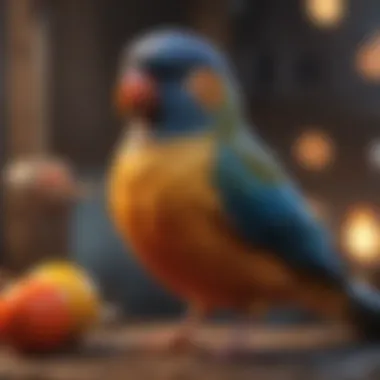
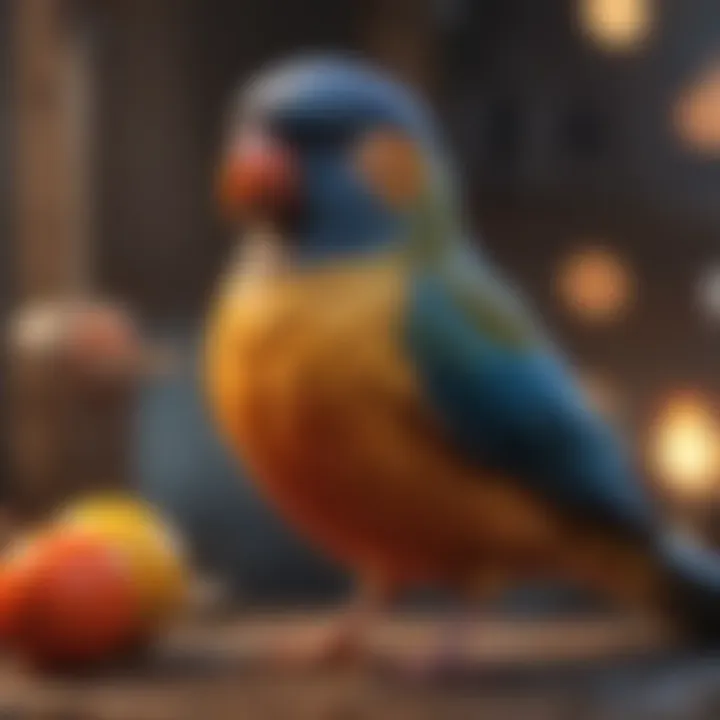
Calcium supplements hold significant weight in the diet of bird species, especially during breeding seasons or when dealing with young ones. Calcium fortifies not only bone strength but also egg production and overall developmental health in chicks.
You can often find these supplements in several formats, like liquid forms, powders, or cuttlebone that your birds can nibble on. They are essential choices in fostering optimal growth and reproductive safety. Adequate calcium intake helps avoid issues such as egg binding in female birds, an issue that can turn serious if neglected.
In summary, understanding and providing essential nutrition supplies isn't just about filling a bowl—it's creating a well-balanced lifestyle for your aviary companions. Every meal plays a role in their happiness and longevity. If you're devoted to your feathered friends, invest in a variety of quality foods and supplements that support their unique nutritional needs.
Habitat Setup Essentials
Creating an ideal habitat for your aviary birds is a matter of utmost importance. The environment they inhabit directly influences their health, well-being, and overall quality of life. Each element of their living space should be thoughtfully designed and curated, emphasizing bird safety, comfort, and engagement.
A well-structured habitat fosters natural behaviors, which is vital for their emotional and physical needs. It is also crucial in preventing stress and behavioral issues in aviary birds. Let's break down some key aspects that constitute the habitat setup essentials for your feathered friends.
Appropriate Aviary Size and Structure
When considering an aviary, size matters. The bigger, the better, as birds require ample space to fly, exercise, and engage in social interactions. A smaller enclosure can lead to frustration and boredom, which may manifest in negative behaviors such as excessive squawking or feather plucking.
You’ll want to ensure that the aviary includes proper ventilation and protection from the elements. At the same time, adequate privacy spots can help alleviate stress for the birds. For example, using natural materials for the wall can provide a sense of security while blending with the surrounding environment.
In planning the structure, it's also wise to consider the layout. Birds thrive in an environment that accommodates their curious nature. An L-shaped or multi-level aviary design not only makes the most of your space but also encourages exploration—a key element in creating a stimulating habitat.
Perches and Toys
Birds need perches to rest, display natural behaviors, and exercise their feet muscles. Simply placing a few wooden bars might not suffice. You should consider the variety of perches and toys to keep your birds active and mentally stimulated.
Types of Perches
Materials matter when it comes to choosing perches. Wooden branches are often a favorite since they provide texture and natural grip. Not only do they come with irregular shapes, but they also allow for different sizes, mimicking a natural environment. This variance helps keep the bird’s feet healthy by promoting grip and agility.
There are also platforms that can assist in creating multiple levels within your aviary. Such designs provide dimensionality, encouraging your birds to explore and engage with their surroundings. However, avoid metal perches unless they are specifically coated for safety. They can be quite slippery and may harm your birds' feet.
Interactive Toys
Toys that stimulate the mind are essential. Interactive toys, such as foraging boxes or puzzles, allow birds to work for their rewards. This isn't merely for fun; it serves an important role in their cognitive development. For example, toys that dispense treats encourage problem-solving and mental acuity, which are crucial for your bird's well-being.
A unique feature of many interactive toys is their adaptability. You can rotate or rearrange them to keep the environment fresh and exciting, ensuring your birds never fall into the boredom trap. Avoid overly complex toys at first; birds need time to learn how to interact with them.
Nesting Supplies
Providing the right nesting materials can greatly affect your birds' comfort and breeding success. Material options including soft grasses, coconut fibers, or shredded paper can be enticing for a nesting spot.
It's also wise to consider the basket or box structure. Many birds prefer a closed nesting box, which provides safety and privacy. However, for some species, an open design encourages a stronger sense of community and alertness.
In summary, the right habitat setups—balancing size, perches, toys, and nesting options—form an essential foundation for aviary birds. Each component plays a significant role in promoting health, happiness, and the natural instincts of these captivating creatures.
"A cozy and stimulating habitat is like a stage for the birds, where they can perform their natural behaviors in front of their greatest fans—their human carers."
By understanding and addressing these needs, you become not just a caretaker but also a vital partner in their journey toward a fulfilling life.
Tools for Engagement and Enrichment
Providing a stimulating environment is vital for aviary birds, as it is for many pets. Tools for engagement and enrichment serve a fundamental role in enhancing the quality of life for our feathered friends. Birds, much like us humans, need mental and physical stimulation to stay happy and healthy. Without adequate engagement, they can become bored, leading to stress or destructive behaviors. Therefore, knowing how to incorporate these tools into their living space cannot be overstated.
Foraging Devices
Foraging devices are ingenious tools that simulate the natural hunting and feeding habits of birds. In the wild, birds spend a good part of their day searching for food, poking around in trees, or exploring crevices. When you can replicate this experience, it encourages them to use their brains and physical abilities.
- Types of Foraging Devices: You might find a variety of devices including puzzle feeders, foraging balls, and treat-distributing toys. These can keep your birds busy and mentally stimulated. You can start with simple puzzles and gradually move to more complex ones as they adapt to the challenge.
- Benefits: Using these devices not only entertains your birds but also quenches their instinctive behaviors, aiding in proper stress management. Research indicates that birds engaged in foraging activities tend to show less aggression and fewer behavioral issues.
- Considerations: Always ensure the materials are bird-safe and avoid devices with small parts that could pose choking hazards. Rotate the devices to maintain their interest; just like us, birds can get bored if the same old toys linger around too long.
Play Structures and Exercises
Physical activity is another key component of avian health. Incorporating play structures and exercises can provide a fun and engaging way for birds to burn off some energy, explore their limits, and develop social skills, especially in multi-bird households.
- Types of Play Structures: You can find a range of options such as swings, ladders, or climbing ropes. Multi-level perches enable them to fly short distances, thereby mimicking their natural behavior.
- Exercises: Try to encourage your birds to participate in simple games. You might toss a small crumpled paper ball for them to chase, or offer clicks and rewards for completing little tasks. This interaction strengthens the bond between you and your bird.
- Benefits: Regular physical activity not only prevents obesity but also enhances their cardiovascular health. After all, a fit bird is a happy bird.
"Time spent engaging with your birds is time invested in their happiness."
In the end, aiming high for their care means putting thought into their environment, providing them opportunities to explore and play, similar to how they'd function in the wild.
Health and Hygiene Supplies
Maintaining robust health and a clean living environment is paramount when caring for aviary birds. Just like us, birds can catch illnesses or suffer from ailments if hygiene isn't a priority. Having the right health and hygiene supplies is essential not only for their comfort but also for their longevity. By investing in specific tools and supplies, bird owners can monitor their pets' health and ensure they are comfortable in their habitat.
Bird Baths and Cleaning Stations
A bird bath is more than just a luxury; it's critical for the overall well-being of your feathered friends. Birds naturally clean themselves and enjoy bathing, which helps keep their feathers in peak condition. A proper bathing area is vital for removing dust and dander from their plumage, ensuring they maintain good hygiene.
When choosing bird baths, consider the following factors:
- Size: Ensure it's spacious enough for your birds to splash around but not too deep.
- Location: Place it somewhere easy to clean and accessible for the birds.
- Frequency of Cleaning: Water should be changed regularly to avoid contamination.
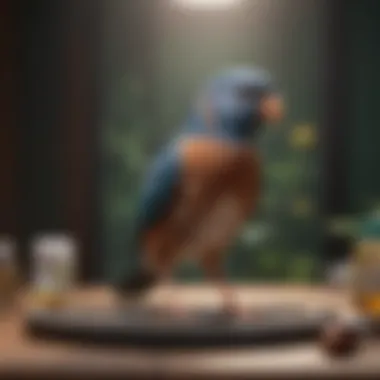
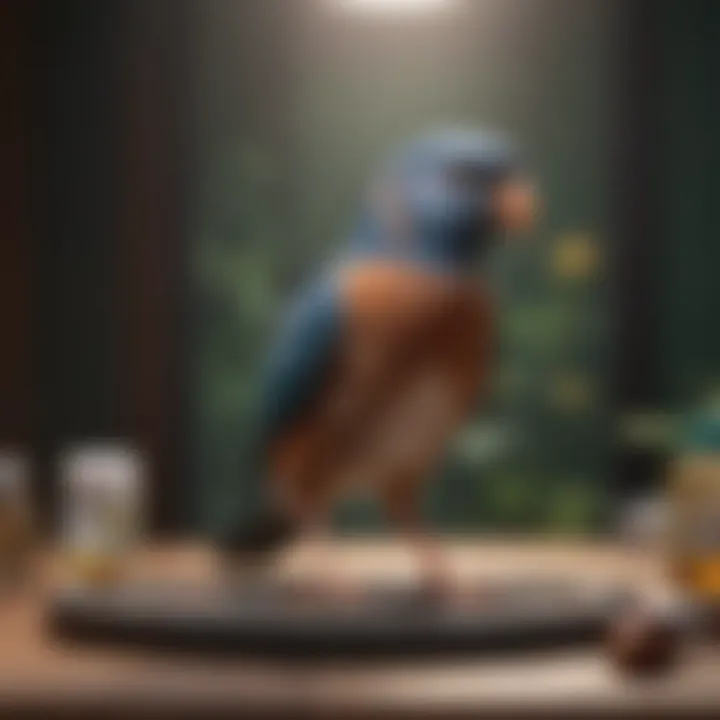
A cleaning station, equipped with the appropriate tools, maintains the aviary's cleanliness. This prevents diseases that can arise from accumulating waste and debris. Regular maintenance is a chore, but it's necessary for a safe habitat.
Grooming Tools
Nail Clippers
Keeping your bird's nails trimmed is crucial to prevent injuries. When nails become too long, they can snag on surfaces, leading to breaks or even tearing the skin. Using nail clippers specifically designed for birds is a smart move.
A key characteristic of these clippers is their rounded tip, which reduces the risk of accidentally cutting too close. They are crafted to make quick, straight cuts, allowing for a smoother trimming experience. Popular among bird owners, a good set of nail clippers often features ergonomic handles for comfort during use.
However, bird owners must approach this task with caution. Over-trimming can lead to bleeding. It's wise to familiarize oneself with the anatomy of a bird's toe before using clippers. The learning curve can be steep, but the result—healthy, well-groomed nails—makes the effort worthwhile.
Wing Clippers
Wing clipping is another aspect of grooming that many bird owners adopt to ensure the safety of their pets. Unlike nails, the objective here is not merely aesthetic but functional, as clipped wings can prevent birds from flying into hazardous situations.
Wing clippers, designed for this purpose, often resemble small scissors, making them easy to control. They allow for a precise cut just beyond the primary feathers, which reduces the chance of accidental injury. These tools are a popular choice, especially for new bird owners who might be anxious about handling their pets.
On the downside, this practice can cause stress for some birds if not done carefully. Proper technique is essential; a poorly performed wing clip can result in discomfort or injury. Engaging a professional or watching tutorials can help ease the learning process for novices.
Health Monitoring Equipment
Thermometers
Monitoring your birds' temperature is crucial, as changes can indicate health issues. A thermometer designed for pets is beneficial for aviary inhabitants. These thermometers often provide quick readings, allowing owners to swiftly assess their birds' conditions.
Many popular choices in pet thermometers are digital, providing clear readings in an instant. The compact size makes them easy to maneuver, reducing the stress on the bird during the process. Nonetheless, owners must still handle the device carefully to avoid startling their pets.
Using thermometers designed specifically for birds is advised because they account for the small, fluctuating ranges typical of avian species.
Weighing Scales
Weight is an important indicator of an aviary bird's health. A reliable scale can help owners detect changes that might signal health problems early on. Regular weight checks can be vital for identifying nutrition issues or stress factors.
Many scales available on the market come with a perch, allowing birds to stand comfortably while being weighed. This feature makes the task more manageable and reduces anxiety for the bird. The balance and ease of use are key characteristics that contribute to its popularity among bird owners.
However, new bird parents should be cautious. Weighing should be done consistently; significant fluctuations might require a visit to the vet. Having a scale handy is essential for responsible bird care, ensuring your feathered friend remains in top condition.
Safety Gear and Precautions
Ensuring the safety of your aviary birds is not just an afterthought; it's a necessity that every responsible bird owner should prioritize. Safety gear and precautions can significantly prevent unexpected accidents or injuries and foster a secure environment for your feathered friends. Here, we will dive deeper into essential safety features, focusing particularly on locks and secure enclosures that benefit both the birds and their care providers.
Aviary Structure Safety Features
Locks
When it comes to safeguarding your birds, the inclusion of robust locks is a must. These locks are crucial for preventing unauthorized access - whether from children, pets, or even a curious neighbor. The key characteristic of a good lock is its durability. Many owners opt for padlocks with weather-resistant coatings that can withstand outdoor elements while providing the security needed inside.
One unique feature of locks designed for aviaries is the dual-lock mechanism. This is beneficial because it adds an extra layer of security, making it harder for accidental openings to occur. Dual-locks reduce the chance that a merely curious hand could swing open a door, potentially allowing an escape. However, one downside could be the slightly higher cost and the need for an extra key, which might be inconvenient for active households.
Secure Enclosures
Secure enclosures are another vital element to consider for the safety of aviary birds. These structures should be made of high-quality materials that can resist attempts at breakouts from the inside, such as strong wrought iron or weather-treated wood. The key characteristic that makes secure enclosures popular is their ability to provide peace of mind. Knowing your birds are safeguarded from outdoor predators like cats or raccoons is priceless for bird owners.
An interesting feature of secure enclosures is the inclusion of safe mesh wiring, which allows for airflow and sunlight while preventing gaps that birds might squeeze through. Nonetheless, it’s essential to ensure these enclosures are well-ventilated and regularly inspected to avoid wear and tear that could compromise safety over time.
First Aid Kits for Birds
Having a well-stocked first aid kit specifically for birds can be a lifesaver in emergency situations. This kit should contain essential supplies such as antiseptic wipes, bandages, and even a list of emergency veterinary contacts. The importance of being prepared can't be emphasized enough, especially since birds can sometimes get into unexpected scrapes or illnesses without much warning. By keeping a first aid kit within easy reach, you send a clear message: the health and safety of your avian companions are of utmost importance.
Community and Support Resources
Creating a safe and nurturing environment for your aviary birds goes beyond just providing them with supplies and proper care. Community and support resources play a vital role in enhancing the well-being of your feathered companions and assist you as a bird owner. Networking with fellow bird enthusiasts, health professionals, and access to specialized online platforms can significantly impact both your and your birds’ experiences.
Veterinary Contacts and Emergency Services
When it comes to caring for aviary birds, having solid veterinary contacts is non-negotiable. Just as a good mechanic is essential for taking care of your car, a reliable avian vet ensures your birds’ health is in check. It's wise to compile a list of local veterinarians who specialize in avian care. Word of mouth often leads you to solid choices, so don't hesitate to consult other bird owners in your area for recommendations.
Moreover, ensure that these veterinary clinics are equipped to handle emergencies. Factors to consider include:
- Availability: Does the clinic offer emergency services, particularly after hours?
- Experience: Are the veterinarians familiar with the specific species of birds you keep?
- Facilities: Does the clinic have proper equipment for treatment and diagnostics?
Having a vet that understands birds deeply is crucial. Their knowledge goes beyond mere basic procedures and extends into behavior, dietary requirements, and specific ailments unique to your feathered friends. When an emergency arises, you want to be prepared and have immediate access to a professional who can handle the situation effectively.
"In an emergency, time is of the essence. Always have a plan in place and know who to call for help."
Online Resources and Forums
In today's digital world, online resources and forums can be invaluable tools for bird owners. These platforms can help you remain informed about avian care, share experiences, and connect with like-minded individuals. Websites like Reddit and specialized Facebook groups host communities where pet bird owners gather to discuss everything from basic care tips to specific issues like behavioral problems.
- Forums: Joining forums allows you to ask questions and receive answers from a broader community. You can read past discussions or even start a thread for your particular concern.
- Resource Websites: Some dedicated avian care websites provide articles, how-to guides, and eBooks that can deepen your understanding of avian needs.
- Social Media Groups: Engaging in Facebook groups provides a space to share pictures, stories, and relatable experiences that can make the journey as a bird owner feel less isolating.
In essence, having access to these community resources equips you with the confidence to be a better caregiver. The knowledge you gain will not only improve your ability to care for your birds but also enable you to contribute back to the community.
By tapping into diverse community resources, you’re setting your aviary birds up for a happier, healthier life, all while creating connections that can enrich your own experience as a bird owner.















